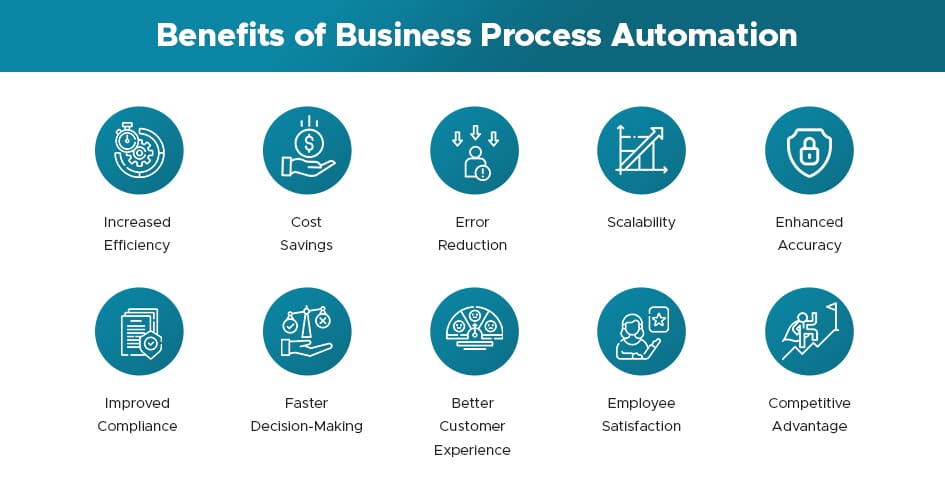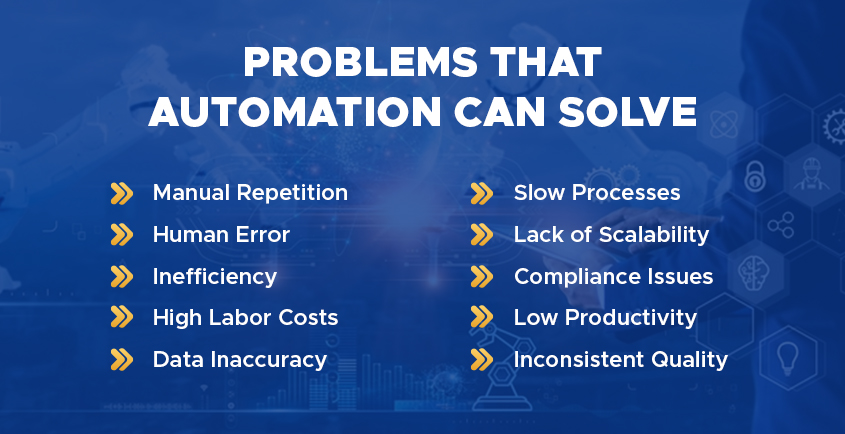In the past, you may have had to rely on manual business workflows to carry out tasks, involving anything from data entry to invoicing. While these processes may have worked in the early stages of your business, as you grow, these tasks can quickly become time-consuming and prone to errors. That’s where business process automation comes in.
With BPA, you can automate these tasks, allowing your team to focus on more strategic, value-adding activities. From customer support to sales and marketing, virtually every aspect of your business can be automated, streamlining your operations and boosting your productivity.
The Importance of Automation for Growing Businesses
Why is automation so important for growing businesses? Automation can help you save time. Automating routine tasks can free up your team’s time to focus on more critical activities. This can lead to increased productivity and efficiency, driving your business forward.
Moreover, automation can help you reduce costs. By reducing the need for manual labor, you can cut down on your overhead costs. Furthermore, automation can help minimize errors. With business process automation software, you can ensure accuracy and consistency, reducing the risk of costly mistakes.
Lastly, automation can scale your business. With automation, you can handle more tasks without increasing your workforce. This can help you grow your business without necessarily increasing your costs.
A Look at The Automation Statistics
The importance of automation isn’t just theoretical. The stats back it up. According to a report by McKinsey, automation could raise productivity growth globally by 0.8 to 1.4 percent annually. Meanwhile, a study by Deloitte found that companies that have implemented automation have seen a 20% reduction in costs.
Furthermore, a survey by Forrester revealed that 58% of companies plan to use robotic process automation (RPA) by 2021. These statistics underscore the growing trend towards automation and the benefits it can bring to businesses of all sizes.
Understanding Business Process Automation Software
So, what exactly is business process automation software? Essentially, it’s a type of software that automates routine business processes. This can include anything from invoicing to customer support.
With business process automation software, you can automate these tasks, saving time and reducing the risk of errors. The software works by following pre-defined rules and workflows. This ensures consistency and accuracy, making your operations more efficient.
Many business process automation software types are available, from general-purpose tools to specialized solutions. The right software for you will depend on your business needs and goals.
Strategies for Implementing Business Process Automation
Implementing business process automation (BPA) can significantly improve efficiency, reduce errors, and save time and resources. However, it requires careful planning and execution. Here are some strategies to consider when implementing business process automation:
Identify and Prioritize Processes:
Begin by identifying the processes within your organization that are prime candidates for automation. These are typically repetitive, rule-based, and time-consuming tasks.
Set Clear Objectives:
Define clear and specific objectives for automation, such as reducing processing time by a certain percentage, minimizing errors, or improving customer satisfaction. Having measurable goals helps track progress.
Involve Stakeholders:
Engage all relevant stakeholders, including employees who perform the processes, to get their input and buy-in. This will help you understand their pain points and concerns.
Select the Right Tools:
Choose the appropriate automation tools or platforms that align with your organization’s needs and objectives. Standard automation tools include robotic process automation (RPA) software, workflow management systems, and custom software development.
Design Workflow and Processes:
Redesign the processes you intend to automate for maximum efficiency. Eliminate unnecessary steps, simplify workflows, and ensure that they are well-documented.
Data Integration:
Ensure the automation system seamlessly integrates with existing data sources and methods. Data quality and consistency are crucial for successful automation.
Test and Refine:
Before rolling out automation on a large scale, conduct pilot tests and gather user feedback. Use this feedback to refine and improve the automated processes.
Security and Compliance:
Implement security measures to protect sensitive data and ensure compliance with relevant regulations (e.g., GDPR, HIPAA). Security and privacy should be at the forefront of your automation strategy.
Change Management:
Prepare your employees for the changes automation will bring. Provide training and support to help them adapt to new roles and responsibilities.
Monitoring and Optimization:
Continuously monitor the performance of automated processes. Use analytics and key performance indicators (KPIs) to identify bottlenecks or areas for improvement and make necessary adjustments.

How Can RPA From SVAM Help You Automate Business Process?
If you’re looking for a solution to automate your business processes, consider SVAM’s RPA services. SVAM is a leading provider of business process automation services, helping businesses like yours automate their operations and boost their productivity.
With SVAM’s RPA services, you can automate tasks across various systems and applications. This can include anything from data entry to customer support. Automating these tasks can save time, reduce errors, and cut costs.
Moreover, you can scale your operations without increasing your workforce with the right automation tools and support. This can help you grow your business while keeping your costs in check.
Embracing Automation for Business Growth With SVAM
In conclusion, automation is a powerful tool for growing businesses. Automating your business processes can save time, reduce costs, and boost your productivity. Moreover, with the right business process automation software and strategies, you can scale your operations and drive your business forward.
Whether you’re just starting your automation journey or looking to take it to the next level, SVAM can help. With our business process automation services, we can help you automate your operations and achieve your business goals. So why wait? Start embracing automation for business growth with SVAM today.





